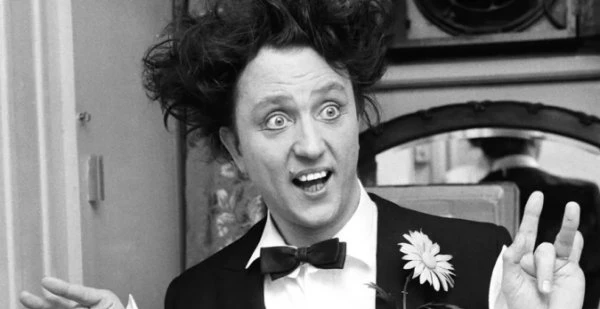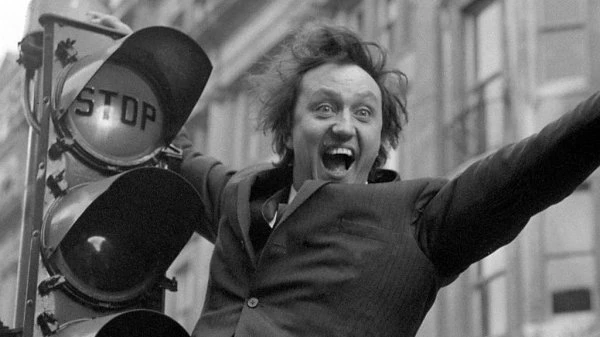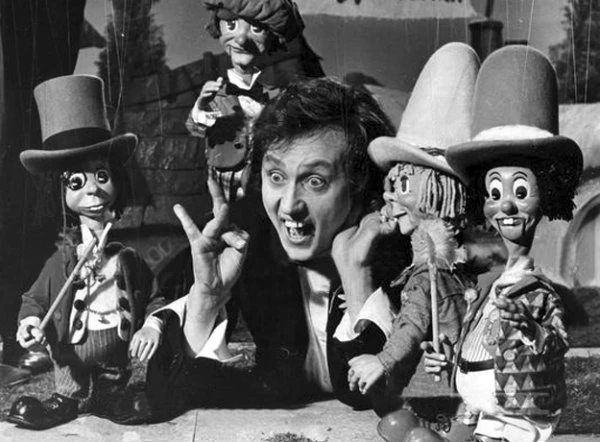
Ken Dodd
Biography: Brian Slade
Somewhere within his marathon stage shows, which were notorious for running in excess of five hours into the early hours of the morning, Ken Dodd, who largely ignored references to his own appearances on television, threw in just one comment that, ‘I don’t do much television these days because I can’t cook!’ But to simply consider ‘Doddy’ as a stage comedian rather than somebody that had a successful television career would be an error. It’s just fair to say that television rarely quite managed to properly capture the endearing magic of our Ken’s Happiness Show that he toured with until his nineties.
Born Kenneth Arthur Dodd in 1927, many people believed that his birthplace, Knotty Ash, was actually a fictitious town. Dodd made such continual references to a bizarre childhood of jam butty mines and Diddy Men, something originally conjured up by Arthur Askey, that his audiences often believed Knotty Ash was merely a creation of Dodd’s brilliant comedy mind, but it was arguably the love of his life. Dodd was born in the same Knotty Ash house he would inhabit for his entire life, passing away there in March 2018.

Dodd’s early years would provide the breeding ground for many of the stories that would inhabit his routines for his entire life. Working with his coal merchant father from the age of 14 and travelling the country with a ventriloquist doll from 18, he would finance his comedy performances by touring as a hardware salesman. Throughout his career, ventriloquism formed part of his full act, with favoured Diddy Man puppet Dicky Mint remaining a closing part of his routine all the way to his final show in 2017.
Through years of toil on the comedy club circuit, Dodd eventually got his breakthrough in 1954 as a minor part of a variety show at the Nottingham Empire. Amongst his skits was a version of On The Road to Mandalay performed wearing a sombrero with dangling ping-pong balls, another routine that would remain for many years. His rise to stardom would be at a rate of knots. Within a year, he was making his television debut on The Good Old Days, a perfect vehicle for his audience-involving ‘How about you missus?’ style of comedy.
Television beckoned and despite being in its infancy Doddy, as he would affectionately be referred to by the majority of his fans, had his first full series by the late 1950s. The Ken Dodd Show ran across the 1960s, and during this time he became hot property. By the end of the 1950s, he had added the song Love Is Like A Violin to his stage show, and it spawned an additional career as a singer, which in itself was a remarkable success. Love Is Like A Violin became a top ten hit, with Tears hitting the number one spot in 1965.

Dodd had surprisingly twice turned down appearing on the hit television show of the day, Sunday Night at the London Palladium. However, with Tears flying high in the charts, Dodd began an astonishing 42-week sell-out run at the Palladium in Doddy’s Here, where he developed his act to perfection and gained his reputation for running longer shows than anybody else in the business.
When Dodd was asked to elaborate on his comedy content, he simply said it was a reflection of life – he spoke of the audience, the towns of his venues at the time, ingratiating himself to the expectant crowd. He used his own bizarre dialect at times and as his various television shows gained popularity, he discovered a new audience in the form of family comedy and the Diddy Men. His appearance remained an integral part of his routine. Bucked teeth, which he admitted he could have had fixed but were an essential visual part of his act, his bizarre mess of hair – they were all ingredients in the persona that he honed throughout his career.

By the time The Ken Dodd Laughter Show hit screens in 1979, public tastes were changing. The Ken Dodd Laughter Show was essentially an extension of his stage show. Doddy would arrive immediately addressing his studio audience, advising them of the theme for the show and then launching into musical compilations before following with a mixture of themed stand-up monologues and sketches. It was all delivered at the relentless pace audiences were so accustomed to hearing.
But as successful as Dodd was, television comedy was become edgier. His stage show contained a certain level of Blackpool postcard-style bawdiness, but vulgarity was never a line he wanted to cross. All was innuendo and nothing more, and aside from a six episode series in 1982 on the business of show business, Doddy would never resurface in his own series again.
As Dodd’s television powers fell away, the 1980s became a decade of turmoil for Dodd. Brought in front of the courts on allegations of tax fraud, a bizarre trial ensued where Dodd could still not resist the audience before him, and as colleagues queued up to provide character references and with help from a remarkable defence, he was acquitted after a five-week trial. Eventually, the experience would creep into comic material for his act – ‘self-assessment? I invented that!’

Television had a strange relationship with Dodd in the last 30 years of his career. It acknowledged the quality of his comedy and paid tribute to it within numerous documentaries. He was even the subject of a special 500th episode of This Is Your Life, but television never found him a new vehicle of his own. In 1994, An Audience with Ken Dodd was aired and he believed that his helped him reinvent his career and find another new audience. The programme was such a success that he returned for Another Audience with Ken Dodd in 2002. Both shows were phenomenally popular and perfectly blended his stage show with a television viewership.

Ken Dodd said he believed he could give people happiness. In a 1994 Face To Face edition of The Late Show, Dodd was asked about whether he would ever retire. The answer was a firm ‘no,’ health permitting. ‘I can’t think of anything more wonderful than to go onto a stage, or into a television studio, or a radio studio and just to give laughter – to hear the sound of laughter and know that I had something to do with making them laugh.’ To paraphrase Dodd’s closing tune, he certainly provided more than his share of happiness.
About Brian Slade
Born and raised in Dorset, Brian Slade turned his back on a twenty-five-year career in IT in order to satisfy his writing passions. After success with magazine articles and smaller biographical pieces, he published his first full-length work, `Simon Cadell: The Authorised Biography'.
Brian is a devoted fan of the comedy stars of yesteryear, citing Eric Morecambe, Ken Dodd, Harpo Marx and Dudley Moore amongst his personal favourites. He was drawn to the story of Simon Cadell through not only `Hi-de-hi!' but also `Life Without George', a programme he identified with having grown up in the Thatcher era.
Published on February 7th, 2020. Written by Brian Slade for Television Heaven.









